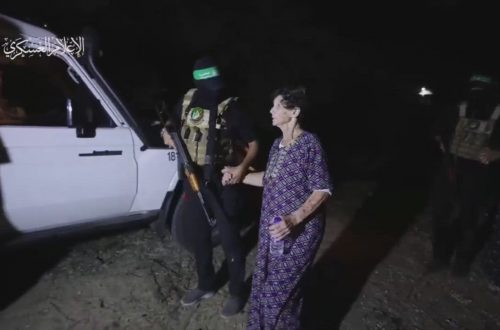Is the best way to achieve a lasting settlement to the Israel-Arab conflict, to exert external pressures on Israel’s government?
The argument that lies and boycotts will help Israel achieve a peace which is in its interest, and should therefore be unopposed, is premised on a number of mistaken assumptions. The first is that successive Israeli Prime Ministers are, like Arab dictators, absolutist rulers whose freedom of manoeuvre is unconstrained.
That assumption is incorrect: the boundaries of Israel’s choices are set by electoral politics, because it is a democracy. What dictates its actions, therefore, is what its voters will allow. Israel can certainly be isolated and besieged by external pressure: but it can only be changed as a result of internal choice. That choice is dictated by one, vital factor: existential threat. Therefore, if you want to change Israeli politics, you need to think of ways to convince the Israeli electorate that a deal is possible, that will lead to a permanent peace, and which will not result in an armed Iranian client militia (or militias) that is dedicated to its extinction killing its citizens, and trying to draw it into another war.
A second assumption which needs to be tested, is that the Palestinian leaderships are desperate to make peace, and that Israel stands in its way. Building within settlements is, presently, the main evidence for that proposition. But remember, before Obama called for a settlement freeze, Abbas refused to negotiate properly. When Obama called for a settlement freeze, and it was put in place, Abbas still refused to negotiate. The settlement freeze wasn’t the issue.
My view on settlements is simple. There should be no building within settlements at all, until there’s a deal on borders, identifying land swaps. Nevertheless, the Palestine Papers point to the real obstacle that has prevented Abbas from returning to the negotiating table, and it is not settlements. Rather, it is a significant Palestinian political elite which has not accepted the existence of Israel, or Jewish self-government, and a craven President, who does not want to be remembered as the man who gave up for good the dream of a single Arab-ruled Palestine. That is why there was no real movement on the Palestinian refugee issue, and a refusal to recognise Israel’s Jewish character. If that really is the position that Abbas finds himself in then no amount of unilateral concession-granting, no “good faith” gesture, will change that position. It might even make a negotiated settlement less likely: by creating the impression that more will be given away by Israel, the longer that Fatah holds out.
Of course, that analysis might be too pessimistic. Abbas may see now as a time to make an imaginative and heroic leap. Perhaps the “right of return” really is a bargaining point for him: to be given away in return for healthy compensation, a deal on Jerusalem, and a legacy as a beloved elder world statesman. The problem, again, is that Israel is a democracy. You need to persuade its voters, those whose lives will be on the line, that the Fatah leadership is able and capable of delivering peace, and that the simple creation of a Palestinian state will establish a new politics for the region, that will bring prosperity and stability for all. In order to do so, you need to set out your understanding of the political dynamic of the region, and how your vision fits into that.
There’s a truism, that I think is disasterously false, that the creation of a Palestinian state beside Israel will solve or at least ameliorate the various divisions within the Middle East. I just don’t see how it could. The Israel-Palestine dispute is not the only, or the most important fissure in Middle Eastern politics. A declining Arab nationalism, the Sunni-Shia split, the various chapters of the Muslim Brotherhood, Salafi Jihadism, and Iranian regional politics: these are all deadlier divisions, which have led to the deaths of many more than the Israel-Palestine conflict. Most of these movements are independent, to a greater extent, from the Israel-Palestine issue, although they do of course all have their fingers in that pie. And all of them, despite their significant differences, are opposed to the continued existence of Israel, and of Jewish self-rule. They are also part of the equation.
None of this means that a Palestinian state should not, or could not be created. People have a right to self-determine, and a determined Palestinian movement to establish such a state, could certainly bring one into existence. Moreover, there is a formula for a permanent Israel-Palestine peace settlement, which is a familiar one, and which has been rehashed in various iterations in assorted forums for decades. The creation of a Palestinian state is central to that resolution. However, the only way that such a state could lead to a de-escalation of regional tensions, is if it were accompanied by a genuine acceptance of Jewish self-determination.
Is there any evidence that the Palestinian leadership, with its continued demand that Palestinian refugees should return to Israel, not Palestine, has accepted Jewish self-rule?
I can understand, and sympathise with the incredible frustration that the conflict engenders, particularly among the majority of Jews who are hopeful for peace and justice for all in the region. It is a natural reflex. For Jews, it is particularly strong: because hostility to Israel, and indeed, Jews who defend Israel in public argument, often coincides with antisemitism. It is absolutely horrid to be hated for your ethnicity or cultural identity. So, the impulse to do something about it is strong.
Is antisemitism a product of the Israel-Palestine dispute? Yes, to the extent that Jews are assaulted when war breaks out. But it is also true that antisemitism is also the reason that the Israel-Palestine dispute persists. It is very difficult for people not to see this conflict through a Biblical, or Quranic prism. Those who are religious, openly declare it to be so. Those who think of themselves as wholly secular, and are therefore sometimes religiously unschooled, nevertheless see the conflict in terms of a battle between good and evil, of epic proportions. In doing so, they sometimes fail to realise that they’re simply reproducing old religious perspectives in a new guise.
The problem is this. The Biblical nature of the conflict also makes it more difficult for both sides to make concessions. To give a simple example, a regional framework of cooperation binding together an independent and prosperous Israel and Palestine would be wholly achievable, were it not for the fact that a significant percentage of the regional population believes that:
“The Day of Judgement will not come about until Moslems fight the Jews (killing the Jews), when the Jew will hide behind stones and trees. The stones and trees will say O Moslems, O Abdulla, there is a Jew behind me, come and kill him. Only the Gharkad tree, (evidently a certain kind of tree) would not do that because it is one of the trees of the Jews.”
That is not empty rhetoric – it is a genuinely held belief that the End Times will be marked by an epic genocide of the Jews.
It is mistaken to think that, because that a brighter Israeli and Palestinian future is achievable, it will inevitably come into existence. The forces which oppose that outcome are heavily armed. This certainly doesn’ t mean that people of good will should do nothing. The best thing that people can do, is to support the work of organisations like One Voice, which in its Israeli and Palestinian organisations, seeks to establish capacity for a grass roots two states movement in both populations. You might want to attend the forthcoming One Voice event:
The Arab spring opened up new opportunities and washed away old stereotypes about the Middle East. The voice of the street matters; nolonger can policy towards the region ignore the people of the region.
Could a mass civil society movement be the missing element that has been needed in the failing peace process between Israel and Palestine?
Bringing together voices from the ground with foreign policy experts, the RSA / OneVoice debate promises to challenge old myths and look towards new paradigms of the new middle east.
Speakers to include: Dr Claire Spencer, head of Middle East and North Africa programme, Chatham House; Con Coughlin, executive foreign editor, Daily Telegraph; Tal Harris, executive director, OneVoice Israel; and Samer Makhlouf, executive director, OneVoice Palestine.
14th Jul 2011; 18:00
It goes without saying, that One Voice activists are routinely threatened, and its events disrupted. If you want to do something, go help them.
Finally, I also want to say a couple of things about Zionism. Zionism, in its most basic sense, means continued Jewish self government. It is a reactive ideology: the product of the ethnic cleansing of both Europe and the Middle East, of its Jewish population. Because it is not tied to eternal “religious truths”, it is flexible. But the one point it cannot give away, is Jewish self-government. Nor should it do so: as long as Jews are persecuted because of their ethnicity and religion. There are plenty of Jews who are Zionists, and who are active peace advocates – those who work for One Voice, or people like Alex from False Dichotomies, who attends demonstrations at border towns. All of them are Zionist, because they oppose the final expulsion of the remnant of the Middle East’s Jews from that region.
It is important to realise that this is what the success of the anti-Zionist project would entail.


